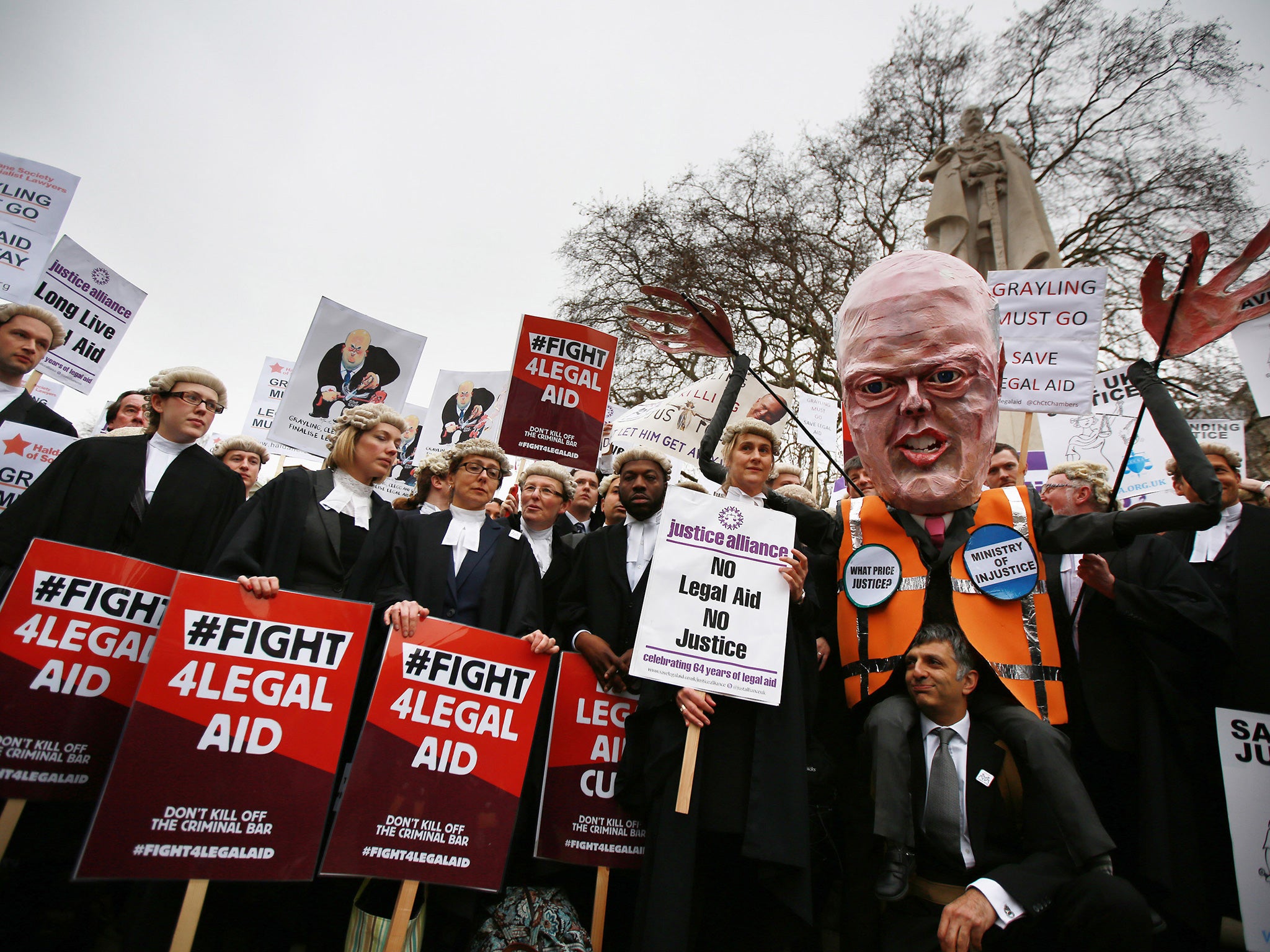Legal aid cuts have left ‘the most vulnerable people’ unable to pursue justice
Amnesty International report lays bare ‘a two-tier civil justice system, open to those who can afford it, but increasingly closed to the poorest and most in need’

Your support helps us to tell the story
This election is still a dead heat, according to most polls. In a fight with such wafer-thin margins, we need reporters on the ground talking to the people Trump and Harris are courting. Your support allows us to keep sending journalists to the story.
The Independent is trusted by 27 million Americans from across the entire political spectrum every month. Unlike many other quality news outlets, we choose not to lock you out of our reporting and analysis with paywalls. But quality journalism must still be paid for.
Help us keep bring these critical stories to light. Your support makes all the difference.
The most vulnerable people in the country have lost the chance to pursue justice because of swinging legal aid cuts, a damning study warns today.
Amnesty International has laid bare the full devastating impact of the withdrawal of funding for all but a narrow list of civil court cases, warning it has been “far worse than anticipated”.
Its 48-page report highlights how the scrapping of early specialist legal advice has left people unable to get the help they need until they “reach crisis point”,
Worse, the cuts have made large areas – across the South West, the Midlands and the North, in particular – “advice deserts”, because free legal advice is disappearing altogether.
And children are among the hardest hit by the changes, with official figures estimating there are a staggering 2,500 fewer immigration legal aid cases each year where children are claimants.
Amnesty said its report made it essential that Theresa May announces an immediate review of the cuts, introduced three years ago – a review promised by April 2018.
As a starting point, all under-18s – a clear “vulnerable group”, unable to represent themselves in court – must be given legal aid, regardless of individual circumstances.
Alice Wyss, Amnesty International’s UK researcher, said: “Cuts to legal aid imposed by this Government have decimated access to justice and left thousands of the most vulnerable without essential legal advice and support.
“We are in danger of creating a two-tier civil justice system, open to those who can afford it, but increasingly closed to the poorest and most in need of its protection.
“From parents fighting for access to their children, to those trying to stay in the country they have grown up in, to people with mental health problems at risk of homelessness, these cuts have hit the most vulnerable the most.”
Amnesty interviewed 30 people who lost eligibility because of the Legal Aid, Sentencing and Punishment of Offenders Act (LASPO), as well as lawyers, law centres and organisations offering advice.
It concluded “they felt intimidated, that they found it difficult to explain their case and that they struggled to understand the process and what the judge was telling them”.
“Sarah” told the researchers: “I feel alone, like I’ve been left in the dark without anywhere to get help - I’m scared about what that will mean for my kids.”
And “Alfred”, in another private family law case, said: “I don’t know the law, I don’t know what to say to make sure I’m heard. I just don’t know how to do it on my own.”
Legal aid was removed in most cases involving debt, education, employment, housing, immigration and private family law (other than some involving domestic violence or child abuse).
LASPO triggered an immediate 46 per cent plunge in the number of cases in which legal aid was granted, from 925,000 in 2012–13 to just 497,000 cases in the following year.
In some areas the fall was even greater – including social welfare law (down 99 per cent), housing (50 per cent) and private family cases (down 60 per cent).
And the number of parents forced to represent themselves before the family courts jumped by 20,000 in 2013–14, despite Government claims that more parents would solve their disputes through mediation rather than in court.
In fact, for the first time, more than half of parents - 58 per cent - went into court without a lawyer fighting their case. Many were mothers from poor backgrounds.
Meanwhile, the Government also introduced a £150 criminal courts charge – encouraging defendants to plead guilty to crimes they had not committed – which it was forced to scrap after a campaign by The Independent.
Ms Wyss added: “If Theresa May is really determined to deliver a country that works for all then there needs to be a justice system for everyone, not just those who can afford it.
“The Government must start by protecting the most vulnerable and launching a review of this failing system immediately.”
A Ministry of Justice spokesperson said: “We have a generous legal aid system – last year spending more than £1.5bn on legal aid.”
Subscribe to Independent Premium to bookmark this article
Want to bookmark your favourite articles and stories to read or reference later? Start your Independent Premium subscription today.
Join our commenting forum
Join thought-provoking conversations, follow other Independent readers and see their replies
Comments